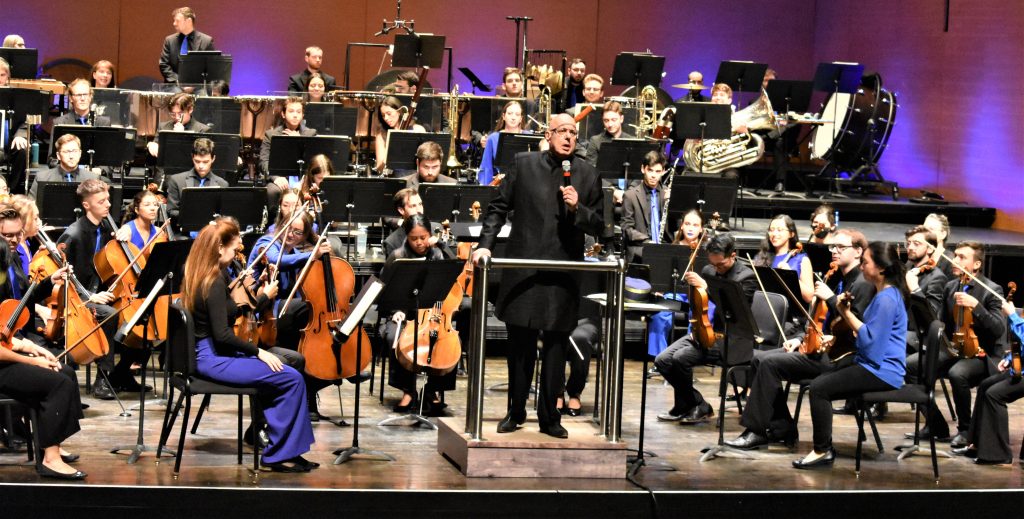
After Dr. Leon Botstein’s introductory remarks at the podium of a program of music in turn of the century Vienna, The Orchestra Now opened with The Merry Widow Overture by Franz Lehár (1940), which was roaringly popular in its time, the audience sampled Viennese pop music with its rolling hills fluffed with pleasant melodies. Yet no one cane to hear this. We were then treated to an older sausage, Bahn frei! (1869) by Eduard Strauss where we heard the genuine Viennese clichés. We were being educated on how dismal and conventional Viennese music could be as if we were at a small-town train station for its annual commemoration.
Botstein removed his official engine driver’s cap, and we heard Kaiser-Waltzer (1889) by Johann Strauss II, who was a close friend of Brahms. Although I had never heard this work performed and was determined not to like it because I am not a fan of either the waltz or an Emperor. Botstein explained how this particular kaiser was not really such a bad chap who enjoyed ethnic diversity, but the problem at this time was the rise of antisemitism on the part of small-town rabid politicians looking for propaganda to advance their ambitions at the expense of a minority, deciding that the twelve percent of the population which was Jewish, would make an excellent scapegoat for local problems. Well, this Emperor Waltz was much more interesting than I expected: the flutes and horns, especially French horns and trombones, were especially good and I wasn’t feeling as if I was choking on a piece of yesterday’s stale toast.

At Intermission members of the orchestra are encouraged to mingle a bit with the audience. I cornered a young trombonist who looked lost. Zach Johnson, principal trombonist for the first and third piece, told me how he became a trombonist. In fourth grade at music sign-up, he wrote down saxophone, yet a trombone was placed on his desk the next day; he stuck with it. At the end of his sophomore year in high school, he went to a summer camp. A friend of his told him that he must listen to Tchaikovsky’s Fourth Symphony. He did and fell in love with classical music. I told Zach everyone was here to hear Gustav Mahler. Unfortunately, he was not the principal trombonist in the Mahler—Stephen Wimple was, and he played marvelously.
Gustav Mahler’s Sixth Symphony (1905), a favorite of Leonard Bernstein, requires a large orchestra while being fairly short, and is not often performed—that is why people were in their seats; it is not his sunniest symphony, yet its orchestration is amazing, as are all of Mahler’s symphonies are. I agree with Bruno Walter’s remark that the symphony is pessimistic. The opening march, which is as eerily haunting as it is hypnotic, appears to document the social poison of anti-Semitic; society on a march to the grave. The Andante celebrates the rural joys of nature and the happy marriage of Gustav and Alma; it supplies escape, enchantment, and the core of love which the many strings fervently delivered. The Scherzo, which is usually a joking movement, is here very serious: it laments the death of their very young daughter; the music eschews formula and the emotion evoked runs deep for a life that cannot bloom.

The Finale Allegro is a fun-house of mirrors and sound. Here the autobiographical narrator has clearly had enough of social insanity—that sort of social insanity that now plagues this country. The correlation to our current reality could not be more musically parallel than now in a portion of this country’s embrace of popular (yet elite) criminality and varied forms of ethnic prejudice which is our march to death: toss out the constitution, law, and democracy for an insane entertainer, another Nero manipulating television. The frenzy of the violins, violas, cellos, and double bass, the wails of the trumpets, the masterful, thunderous percussion by Nick Goodson, the lone poignant sanity of Colby Bond on clarinet, the frenzied madness of the flutes, the frenetic passing of passages, and finally the surging madness of the unified Finale that psychologically duplicates the satiric despair that we, those who love this country, now dwell in at this moment with exasperated fear and apprehension, yet this scene was witnessed by Mahler in his lifetime and we now hear it as our living nightmare over a hundred years later! And, yes, in that pessimism there lies an unlikely ray of light, a gentle hope that society will not be damned by the death-march of lies! This last movement was the unforgettable, cathartic, reincarnation of Mahler as if he were alive today….